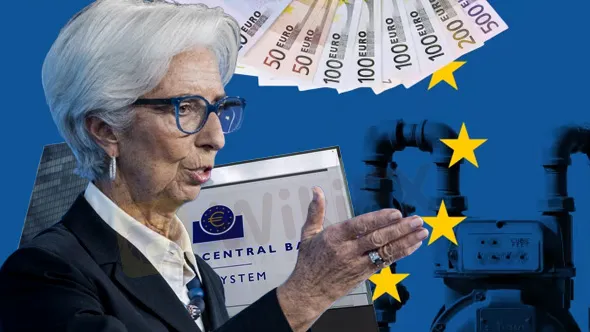简体中文
繁體中文
English
Pусский
日本語
ภาษาไทย
Tiếng Việt
Bahasa Indonesia
Español
हिन्दी
Filippiiniläinen
Français
Deutsch
Português
Türkçe
한국어
العربية
ECB to Cease Bond Purchases in Q3, Lagarde Says EU’s Economic Rebound 'Crucially Depends on How the
Abstract:After the inflation rate in the eurozone reached a high of 7.5% in March, the European Central Bank (ECB) and the bank’s president Christine Lagarde explained on Thursday the central bank’s bond purchases will cease in Q3. Reiterating what she said at a press conference in Cyprus two weeks ago, Lagarde stressed on Thursday that inflation “will remain high over the coming months.”

After the inflation rate in the eurozone reached a high of 7.5% in March, the European Central Bank (ECB) and the bank‘s president Christine Lagarde explained on Thursday the central bank’s bond purchases will cease in Q3. Reiterating what she said at a press conference in Cyprus two weeks ago, Lagarde stressed on Thursday that inflation “will remain high over the coming months.”
European Central Bank Plans to End Asset Purchase Program in Q3
The eurozone is suffering from significant inflationary pressures as rising consumer prices are ravaging European Union (EU) residents. In March, data from the ECB had shown consumer prices skyrocketed to 7.5% and the ECBs president Christine Lagarde expected energy prices to “stay higher for longer.” On April 14, members of the ECB met and then told the press that the central bank plans to cease its APP (asset purchase program) by the third quarter.
“At today‘s meeting the Governing Council judged that the incoming data since its last meeting reinforce its expectation that net asset purchases under the APP should be concluded in the third quarter,” the ECB disclosed to the press. After the APP ends, the bank is expected to start hiking the benchmark bank rate. However, in Lagarde’s opinion, it will depend on what happens with the current Ukraine-Russia war.
The EU‘s economic improvement, Largade said “will crucially depend on how the conflict evolves, on the impact of current sanctions, and on possible further measures.” The central bank’s message on Thursday highlighted that benchmark bank rates won‘t change until end of the APP. “Any adjustments to the key ECB interest rates will take place some time after the end of the Governing Council’s net purchases under the APP and will be gradual,” the ECB detailed in a statement.
Fidelity International Global Macroeconomist: ECB Faces a ‘Tough Policy Trade-off’
Following the ECB‘s and Largade’s statements, the gold bug and economist Peter Schiff threw in his two cents on Twitter about the central bank keeping rates suppressed. “The ECB announced interest rates will stay at zero until it judges inflation will stabilize at 2% over the medium term,” Schiff tweeted. “Eurozone inflation is currently 7.5%. How will throwing more gasoline on a fire put it out? Europeans are stuck with inflation well above 2% indefinitely.” Schiff continued:
The dollar is rising against the euro because the Fed is still pretending it will fight inflation, while the ECB is still pretending inflation is transitory. Once both banks stop pretending the dollar will fall against the euro, but both currencies will collapse against gold.
Speaking with CNBC on Thursday, global macroeconomist at Fidelity International, Anna Stupnytska, said the European Central Bank faces a “tough policy trade-off.” “On the one hand, it is clear that the current policy stance in Europe, with interest rates still in the negative territory and the balance sheet still growing, is too easy for the high level of inflation which is becoming broader and more entrenched,” Stupnytska remarked after the ECBs statements. The Fidelity International economist added:
On the other hand, however, the Euro area is facing a huge growth shock, simultaneously driven by both the war in Ukraine and Chinas activity hit due to zero-COVID policy. High frequency data already point to a sharp hit to Euro area activity in March-April, with consumer-related indicators worryingly weak.
Disclaimer:
The views in this article only represent the author's personal views, and do not constitute investment advice on this platform. This platform does not guarantee the accuracy, completeness and timeliness of the information in the article, and will not be liable for any loss caused by the use of or reliance on the information in the article.
Read more

Europe Analysis: EUR/USD, GBP/USD, EUR/GBP
The ECB's consumer expectations survey shows mixed economic signals with slight improvements in unemployment expectations but unchanged growth forecasts. The euro faces pressure from a strong USD, while the GBP shows resilience, contributing to the strength of GBP/USD and the decline of EUR/GBP.

GEMFOREX - weekly analysis
The week ahead: Traders on the backfoot ahead of a quiet week

Twin Scam Alert: Broker Capitals is a New Domain of Finex Stock
This week, the Italy financial regulator CONSOB issued a warning against an unlicensed broker named Broker Capitals. When we clicked on Broker Capitals' website, its logo, trade name, and design seemed familiar to us.

Berkshire CEO-designate Abel sells stake in energy company he led for $870 million
Berkshire Hathaway Inc said on Saturday that Vice Chairman Greg Abel, who is next in line to succeed billionaire Warren Buffett as chief executive, sold his 1% stake in the company’s Berkshire Hathaway Energy unit for $870 million.
WikiFX Broker
Latest News
Volkswagen agrees deal to avoid Germany plant closures
Geopolitical Events: What They Are & Their Impact?
Top 10 Trading Indicators Every Forex Trader Should Know
WikiEXPO Global Expert Interview: Simone Martin—— Exploring Financial Regulation Change
TradingView Launches Liquidity Analysis Tool DEX Screener
MultiBank Group Wins Big at Traders Fair Hong Kong 2024
'Young investors make investment decisions impulsively to keep up with current trends' FCA Reveals
Why Do You Feel Scared During Trade Execution?
CySEC Settles Compliance Case with Fxview Operator Charlgate Ltd
Malaysian Influencer Detained in Taiwan Over Alleged Role in Fraud Scheme
Currency Calculator


